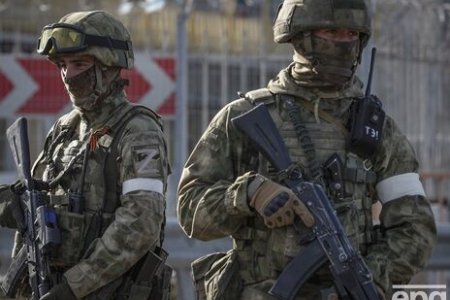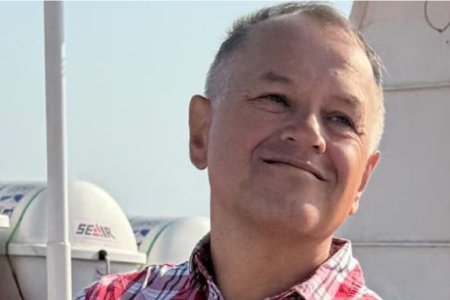
A court in Russia has sentenced Oleksandr Pohorielov to life imprisonment for a killing and attempted killing that Russia is likely to have been behind. As well as cynical, the charges and ‘trial’ are of breathtaking illegality, since they come six years after Pohorielov was abducted and savagely tortured by militants from the so-called ‘Donetsk people’s republic’, an illegal formation which Russia certainly controlled, but had not formally recognized. The aggressor state has now effectively admitted to complicity in the Ukrainian’s illegal imprisonment and torture, with the charges against him under Russian legislation. Most is known about Pohorielov, but three other Ukrainians were also ‘tried’, on some or all of the charges, with Artem Yena sentenced to 17 years; Vasyl Churylov to 13 years and Oleksandr Tymoshenko – to 12 years.
Russia’s prosecutor general reported the sentences on 19 June, claiming that the life sentence had been imposed on “a participant in a terrorist organization”, with the latter purportedly behind the 2016 bomb blast “which killed the commander of a military unit of the ‘DPR armed forces’ Arsen Pavlov and ‘soldier Yevgeny Gadliya.” What Russia refers to as the ‘DPR armed forces’ were a motley bunch of Russian and pro-Russian fighters, including very many mercenaries. One of these was, in fact, Arsen Pavlov, more notorious as ‘Motorola’ and wanted by Ukraine for war crimes which he himself had boasted of.
Pohorielov and Churylov were claimed to have, from June 2016 until their detention in 2017, “taken part in a terrorist society created by the SBU [Ukraine’s Security Service] in order to carry out terrorist activities on the territory of DPR.” It was further asserted that, before his alleged joining of a fictitious ‘terrorist society’, Pohorielov had, in 2014, “first alone, then with his friend Tymoshenko carried out SBU tasks, gathering and passing on information about military sites for use against DPR security”. He is supposed to have, in April 2015, taken part in training in Kyiv on the rules regarding use of weapons; explosive devices and substances,
Pohorielov was also accused of a role in two other supposedly thwarted attempts on the lives of prominent ‘DPR’ militants, Aleksei Vydrin (with Yena also accused of a role) and Oleksandr Zakharchenko. The latter was installed by Russia within weeks of the downing of Malaysian airliner MH17 by a BUK missile over occupied Donbas. One of the Russian leaders removed, Aleksandr Borodai, has confirmed that he and other Russians ‘in charge’ were removed in an attempt to hide the degree to which Russia was behind the so-called ‘republics’ and behind the killing of 298 passengers and crew of MH17. Zakharchenko was killed in a bomb blast in August 2018.

All of the above ‘assassination attempts’ have been blamed on numerous Ukrainian civilian hostages taken prisoner by the Russian proxy ‘Donetsk and Luhansk republics’.
Worth noting that, despite the Russian prosecutor’s claim that the alleged earlier attempt on Zakharchenko’s life was aimed “at stopping his state activities” all of these militants, including Zakharchenko were entirely legitimate targets. If Zakharchenko was carrying out ‘state activities’, why did Moscow only ‘recognize’ its proxy ‘republics’ on the eve of its full-scale invasion of Ukraine?
In fact, there are very strong grounds for doubting all aspects of the charges illegally laid by the aggressor state against the four Ukrainians.
At least in the case of Oleksandr Pohorielov, this extraordinary life sentence is on the same charges as those originally laid by the ‘Donetsk republic’ while it was not recognized by Russia. The charges derived, moreover, from a videoed ‘confession’ almost certainly extracted from Pohorielov through torture around three weeks after the successful attack on Zakharchenko. Soon after the bomb blast that killed Zakharchenko, Pavlo Lysyansky, then the Ukrainian Human Rights Ombudsperson’s representative in Donbas, reported that he was aware of 19 people in Donetsk having disappeared. His source had said that four of the 19 had already ‘confessed’ to working for Ukrainian authorities, almost certainly under torture.

Since Pohorielov had been held hostage in ‘DPR’ since 30 November 2017, he could not be accused of actually killing Zakharchenko on 31 August 2018. The videoed ‘confession’ posted on Russian and pro-Russian propaganda media, therefore, showed him only ‘confessing’ to an earlier attempt on Zakharchenko’s life. Pohorielov speaks suspiciously quickly, as though reciting what he has been forced to memorize, and the video is clearly a montage. There is every reason to assume that any ‘confessions’ from the other men sentenced in this case were obtained in the same way.
On the video posting by the Russian defence ministry-linked ‘TV Zvezda’, Pohorielov said that he had been ‘recruited’ by the SBU in 2014, and had adopted the code-name ‘Legioneer’. The story posed more questions than it answered about his supposed attempt, and was probably intended mainly to build a story about another ‘Ukrainian sabotage group’ which could be blamed for the successful attempt on Zakharchenko. The latter, it was claimed, were planning to use a new system for a remote-controlled explosive device which had been tested in Kyiv but never used, and provided by the “US security service.”
The ‘’confession’ to killing Pavlov / ‘Motorola’ was, presumably, extracted later, almost certainly through the same forms of torture. Since Pavlov / ‘Motorola’ was killed in October 2016, Russia has gone to enormous lengths to glorify this mercenary and war criminal, while assiduously avoiding mentioning that he was Russian.
Russia’s state-controlled TASS agency reported the new charges on 29 August 2023, while also calling Pohorielov the main suspect in the killing of Zakharchenko, a full eight months after he had been seized and imprisoned in ‘DPR’.
Igor Girkin, the other main Russian behind the creation of ‘DPR’ (and one of three men sentenced by a court to Hague to life imprisonment for his role in MH17), has also provided many incriminating details about Russia’s war against Ukraine since 2014. Late in 2021, he stated that it was Moscow that had organized Zakharchenko’s killing, as he was not at easy to control as Denis Pushilin, who was installed in his place. He made a similar suggestion about the killers of Motorola in October 2020.
Russia’s ‘trial’ of the four Ukrainians took place at the Southern District Military Court in Rostov, a court that has been responsible for passing huge sentences against Crimean Tatar and other Ukrainian political prisoners since 2014. There were a large number of hearings, so it is likely that the sentence handed down by presiding ‘judge’ Aleksandr Vasilyevich Generalov and two others will be appealed.



